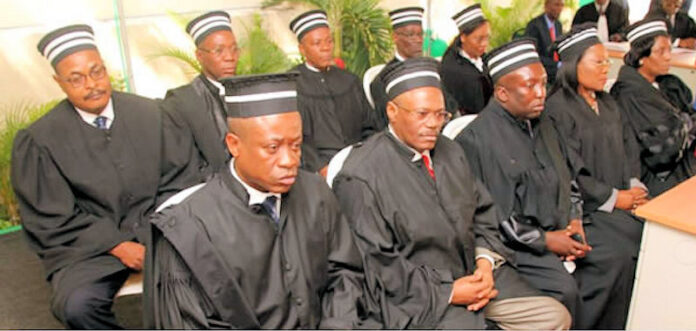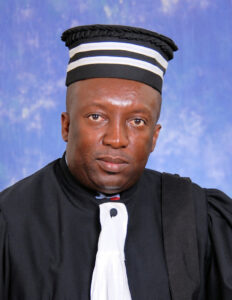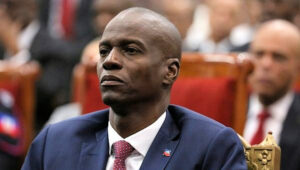
On Fri., Nov. 6, the Haitian government published in Le Moniteur a new decree limiting the powers of the Superior Court of Auditors and Administrative Disputes (CSCCA). The decree itself was signed by the president and ministers nearly two months earlier, on Sep. 9, but was not formally made public until that weekend. The court, one of only a handful of nominally independent government institutions, is responsible for reviewing draft government contracts as well as conducting audits. While its functions and title have been altered over time, the court was first established in 1823 and was only completely eliminated during the 19-year US occupation of Haiti. It was reestablished afterward and enshrined in Haiti’s 1987 constitution.
President Jovenel Moïse has ruled by decree, which is not formally allowed under Haiti’s constitution, since January 2020, when the terms of most of Parliament expired. Expanding executive powers, he has reformed the penal code, named a new electoral council with a mandate to rewrite the constitution, and now weakened one of the last remaining institutions exercising government oversight. The latest decree follows years of conflict between the CSCCA and the Haitian presidency.

In 2018, anticorruption protesters began advocating for an investigation into Moïse and his predecessors’ handling of billions in spending from Haiti’s PetroCaribe Fund, a capital account filled with revenues from the sale of Venezuelan oil between 2008 and 2018. Moïse, under increasing pressure from the streets, pledged to support such an investigation. The CSCCA has since released three audit reports on money taken from the Petrocaribe Fund, finding widespread irregularities and fraudulent practices in the projects it underwrote. The CSCCA reports directly implicated the president and companies he owned and led before his election. Last year, court members had to temporarily leave the country due to threats. As of yet, there has been no real judicial progress in holding anyone accountable for the misuse of public funds. Moïse has denied all the CSCCA’s allegations against him.
The conflict has extended beyond just the Petrocaribe investigation, however. In June, the court raised questions over a contract to provide the presidency with helicopters, which had gone to a close political ally. The same month, the CSCCA was accused of hampering the response to COVID when it identified irregularities in a number of contracts to provide the Health Ministry with face masks awarded under a state-of-emergency exception. The contracts, worth about $10 million, moved forward despite the concerns — which included companies that had no experience in the sector and one which was owned by the wife of a current government minister. The health emergency “served as a pretext … to accelerate the corruption machine,” according to The Center of Analysis and Research in Human Rights (CARDH). The organization found that $34 million in emergency spending had bypassed CSCCA review all together.
the court outlined a series of acts of intimidation and threats on its members.
In late August, the court blocked a $57 million no-bid government contract with the U.S. multinational, General Electric, and asked the government to make needed corrections. The president has presented the deal as a key to his pledge to provide electricity across the country. According to the court, one reason for the court’s delay in approving the GE contract was the presence of unknown subcontractors that were to be paid a portion of the total amount.
On Sep. 6, Moïse held a “community dialogue” at the National Palace, where he declared that it would be necessary to “reform” the CSCCA. Public Works Minister Joacéus Nader went so far as to say the court was blocking progress in the country and referred to its independent judges as “ignorant” and “incompetent.”
In response to comments made by Moïse, the court issued a five-page statement outlining a series of acts of intimidation and threats on its members. The court also provided some of the reasons why it had not approved contracts. “How is the Court responsible for the invalidity of this draft contract? Where are the blocking acts? Who is blocking whom, or who is blocking what?” the court asked.
Prime Minister Joseph Jouthe attempted to ease tensions, apologizing just days later on Nader’s behalf and telling the Haitian daily Le Nouvelliste that while it was possible to remove bottlenecks in contract processing, changes would not be made without the court’s involvement. We now know that by the time of Jouthe’s apology, the government had already drafted and signed the decree curtailing the court’s powers — but it had not yet been made public.
Two weeks after Jouthe’s apology, Nader appeared at the CSCCA’s offices in Pétionville, claiming he and the large group with which he arrived were there simply to check on the General Electric contract’s status. But the CSCCA’s president had a different interpretation: “When you come into an institution with a group of heavily armed men, who have their faces covered and are dressed in black, and whom we can’t even identify if they are police, and they cross all of the perimeters to go into an area that is extremely sensitive, where even some of the judges don’t go to, that is nothing more than an act of intimidation,” Rogavil Boisguéné told the Miami Herald. “It was a threat to prevent the court from doing its job.”

With the recent changes made by decree, the Haitian presidency will no longer have to wait for the court’s approval before moving forward with government contracts. In the decree, the Moïse administration argues that the reform is necessary due to the “unjustified slowness in the signing of contracts,” which, it argues, “is detrimental to the socio-economic development of the country.” A significant change is that the court’s opinions on draft contracts will only be “advisory” now. Furthermore, the CSCCA will only have three to five days to issue an opinion before the government can move forward with the contract in question. Overall, the court’s review has been changed from ex-ante to ex-post; the court will still provide oversight, but only after contracts have been executed.
On Nov. 12, the CSCCA’s president issued a brief statement taking note of the government’s decree. In the release, Boisguéné states that the court’s ex-ante control is derived from a “strict application” of the constitution and reminds public officials that “the administrative and financial responsibilities attached to their functions are strictly personal” and that is it “their responsibility” to “ensure that … opinions are respected within the framework of this constitutional provision.”
Haiti’s public finance system is notoriously cumbersome. In 2016, the World Bank noted that multiple institutions played similar roles in approving contracts and that the CSCCA was conflicted in that it both approved contracts and then audited spending afterward. The National Commission on Public Procurement (CNMP) is also tasked with approving government contracts. “There is considerable debate within Haiti and among donors over the appropriateness and the utility of this ex-ante role [for the CSCCA]. However, it continues to date,” the Bank wrote. The new decree specifies that if the CNMP approves a contract, the CSCCA cannot prevent its execution, regardless of whether irregularities are identified.
the CSCCA had been one of the last remaining institutions able to check the presidency’s powers.
But, shifting the CSCCA’s role without further efforts to ensure it can provide effective oversight on the back-end sends a dangerous message, according to activists. The court would still be able to conduct audit reports such as those it produced on Petrocaribe, but the lack of judicial follow-up to that report serves as an example of why limiting the court to after-the-fact auditing will be of limited value in preventing government waste or holding officials accountable.
With the president having replaced the heads of the anticorruption and anti-money-laundering institutions UCREF and ULCC in 2017, the Parliament now dissolved, and the judiciary seemingly unable or unwilling to take on politically sensitive cases, the CSCCA had been one of the last remaining institutions able to check the presidency’s powers. In a country with a long track record of impunity, the changes have sounded alarm bells.
“Since 1986, we never had a head of state who had shown so much desire to neutralize the institutions of control,” economist Etzer Emile tweeted. “This new decree could open the door for more acts of corruption in a country where impunity is king,” he added. Emile acknowledged that administrative procedures may be burdensome, but “it does not mean we have to remove the locks.” Checks and balances, he continued, “are critical … to guarantee transparency and good governance.”

On Nov. 8, a group of opposition political leaders issued a statement decrying the government’s desire to “to transform the country into a lawless state.” Moïse, the leaders argued, has repeatedly ignored constitutional limits on executive power, and they noted that ministers who sign these unconstitutional decrees could face legal repercussions after leaving office.
The president, in a Nov. 9 interview with Tele Métropole, was defiant. He repeated the argument that the reform was necessary to take on entrenched interests that simply wanted to block progress and claimed that the decree would actually strengthen the CSCCA by allowing it to just focus on its auditing role. There is little doubt that Haiti’s procurement system needs to be reformed, but, in a comment to the Haiti: Relief and Reconstruction Watch blog (HRRW), a former high-ranking government official, who asked to remain anonymous, offered a different rationale for the changes: “To have the road completely opened to allow contracts without any restrictions to his friends or partners.”
The original version of this article was published by the Haiti: Relief and Reconstruction Watch blog (HRRW) on the website of the Center for Economic and Policy Research (CEPR).










